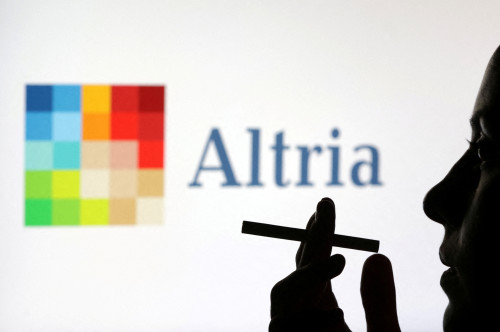(Reuters) -Tobacco giant Altria beat Wall Street estimates for second-quarter revenue and profit on Wednesday, helped by strong demand for its on! nicotine pouches.
The Richmond, Virginia-based company’s shares rose over 4% at one point, and were 2.5% higher at 1406 GMT.
Altria, which makes Marlboro cigarettes in the United States, has been banking on its portfolio of smoking alternatives, such as nicotine pouches, to offset the impact from lost sales as more consumers move away from traditional cigarettes and chewing tobacco.
While sales of Altria’s vape brand NJOY were halted earlier this year amid a patent dispute, higher growth at its on! segment helped make up for the collapse in sales.
The company had said in April NJOY would not return to the market this year, booking a hefty impairment related to its vape unit.
Widespread sales of unregulated disposable vapes, mostly from China, have eaten into vape and traditional tobacco businesses in the United States. Altria said it had seen higher seizures of such devices have an impact in the market, but it saw limited benefit on its own business for the year.
“It is becoming more difficult to import illicit e-vapor products,” CEO William Gifford said, adding wholesalers had reported supply shortages.
The company’s second quarter revenues rose 1.2%, versus an expected decline of 1.8%, while profits hit $1.44 per share versus estimates of $1.39, according to data compiled by LSEG.
Shipment volume for on! nicotine pouches rose 26.5%, while this fell 10.2% at Altria’s smokeable tobacco business.
Rival Philip Morris International’s shares suffered last week after shipments of its ZYN nicotine pouches – by far the No. 1 pouch brand in the U.S. – came in below expectations.
Altria expects annual adjusted earnings of $5.35 to $5.45 per share, compared with previous expectations of $5.30 to $5.45.
Its guidance flagged an increased impact from tariffs. Finance chief Sal Mancuso said this referred to higher costs for packaging such as tin cans, but the impact was not material.
The company has flexibility in its supply chain to mitigate these, he said, adding the same was true for NJOY, which may face higher tariffs when sales re-start in the United States.
(Reporting by Neil J Kanatt in Bengaluru and Emma Rumney in London. Editing by Shreya Biswas and Mark Potter)




